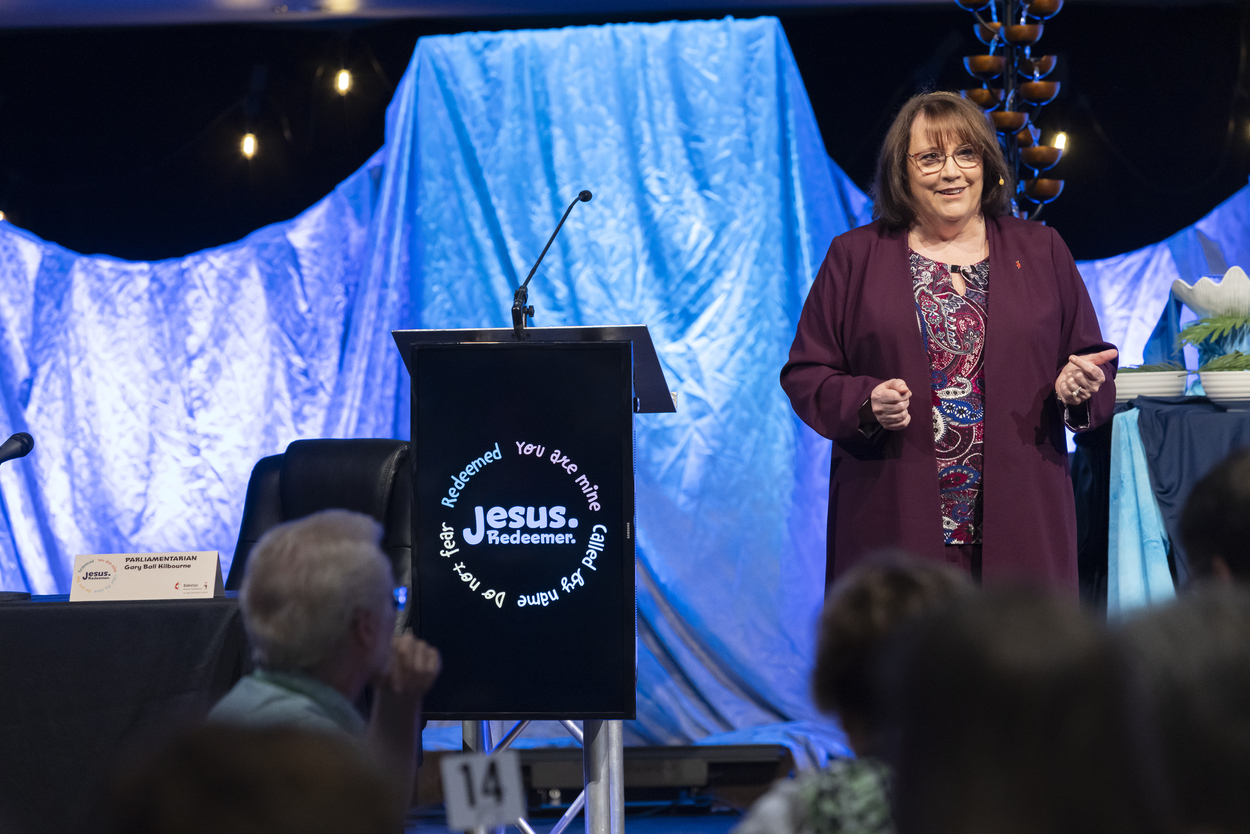
A Wesleyan Word - Bishop Lanette Plambeck

Bishop Lanette Plambeck delivers the episcopal address at the 2024 Dakotas Annual Conference, inviting attendees to "mind the gap" between what "is" and what God is inviting us to.
As Election Day approaches, I am struck by how many United Methodists from across the area are asking me my thoughts on how one's faith and understanding of what it means to be a Christ-follower should inform their political views and votes. I love the way this question is asked because it's about faith informing politics and not politics informing faith.
And it is not a controversial subject. Simply put, one's discipleship journey - who they know themselves to be in Christ Jesus - should inform their decision at the polls. People of faith should wrestle with how to support candidates in a way that aligns with their spiritual beliefs.
For those in the United Methodist tradition, the concept of the "Fruit of the Spirit" from Galatians 5:22-23— love, joy, peace, patience, kindness, goodness, faithfulness, gentleness, and self-control—provides a valuable lens through which to view candidates, policies, and the election process itself.
Recognizing the Fruit of the Spirit in Candidates
The Fruit of the Spirit isn't just a personal guide for Christian living—it can also serve as a framework for evaluating leadership. Here are some key ways the Spirit's fruit might manifest in the political arena:
1. Love: Does the candidate show a commitment to the well-being of all people, especially the most vulnerable? Love, in politics, means advocating for policies that promote dignity, equity, and justice.
2. Joy: Is there a sense of genuine hopefulness and a positive vision for the future in their platform? Joy can be seen in a candidate's ability to inspire and uplift, creating a shared sense of purpose and community.
3. Peace: Does the candidate work to build peace within a divided society? Are they willing to pursue reconciliation and find common ground even with those who hold different views?
4. Patience: Can the candidate remain steadfast in the face of challenges, displaying a long-term commitment to change? Patience in leadership means recognizing that transformation takes time, intentionality, partnership, and persistence.
5. Kindness: Are their policies marked by compassion? Do they treat their opponents and constituents with respect, even when they disagree? Kindness in politics is essential in an environment often marked by hostility and division.
6. Goodness: Do they demonstrate moral integrity and a genuine desire to do good? Goodness involves seeking justice for all, particularly for the most vulnerable and marginalized members of our society.
7. Faithfulness: Is the candidate reliable and trustworthy, showing a commitment to their promises and values? Faithfulness speaks to their accountability to the public and to the principles they claim to uphold.
8. Gentleness: Does the candidate exhibit humility and a willingness to listen? In a world often dominated by aggression, there is a courageous and confident strength revealed in a humble leader who can lead in times of conflict, crisis, and uncertainty.
9. Self-Control: Are they disciplined in their decision-making, showing the ability to lead with restraint, especially in difficult moments? Self-control helps leaders navigate the complexities of governance without being swayed by anger or impulsiveness.
Supporting a Candidate Faithfully
Supporting a candidate as a United Methodist means looking beyond partisanship and personal gain, instead focusing on how their policies and character reflect these Spirit-driven values. The United Methodist Social Principles call for a government that works for justice, equity, and the common good. As you weigh your options, consider how each candidate aligns with these principles, including:
Human Dignity: Do their policies respect the intrinsic value of every person, regardless of race, gender, socioeconomic status, or background?
Care for Creation: Does the candidate demonstrate a commitment to environmental stewardship, recognizing that caring for the earth is an expression of love for future generations?
Peace and Justice: How do they address systemic injustices? Are they advocates for peace, both domestically and internationally, seeking to resolve conflicts through non-violent means?

Faith and Civic Responsibility
Our Wesleyan faith teaches us that politics is not separate from our spirituality; rather, it is an extension of how we live out our faith in the world. The United Methodist Church emphasizes the importance of social holiness, meaning that our spiritual growth is intertwined with how we engage in society. Voting, advocating, and holding elected officials accountable are all acts of discipleship. They are ways to bring the kingdom of God closer to our communities.
We are called to be both prayerful and active in our civic duties, discerning how the candidates reflect the values of the Spirit and the broader call for justice in our world. In doing so, we support not just a person or party but the flourishing of all people, aligning our civic engagement with the gospel's call to love God and neighbor.
As election day draws near, may we seek candidates who embody the Fruit of the Spirit in their actions and leadership. May we, as voters and advocates, align our values not with the shifting winds of political rhetoric but with the enduring call of our faith.
Philippians 4:6-7
Do not be anxious about anything, but in every situation, by prayer and petition, with thanksgiving, present your requests to God. And the peace of God, which transcends all understanding, will guard your hearts and your minds in Christ Jesus.